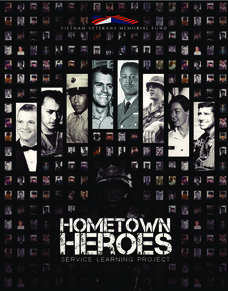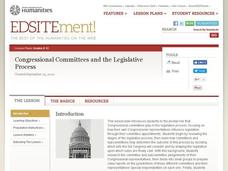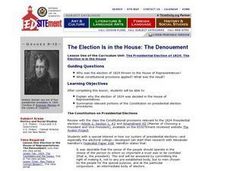Ford's Theatre
Not Just Stone and Metal: Memory and Monuments Today
Should we remove historical Confederate monuments? Teach scholars both sides to the story using a resource that includes a class discussion, reading materials from two prominent figures on both sides of the argument, and an assessment...
PBS
Stories of Arrival
While every family's immigration story is unique, patterns emerge when looking at individual narratives. Using clips from the PBS video series, "Latino Americans," learners look at commonalities among immigrant experiences. A chart helps...
C-SPAN
Debates
How do the presidential debates of 2016 compare to the debates from the 1980's? What about the 1960's? Evaluate a chosen candidate or issue from the 20th and 21st centuries with a lesson plan focused on political debates. Middle and high...
iCivics
Mini-Lesson: Presidential Pardons
How do United States presidents give people second chances? Scholars research the concept of presidential forgiveness, or pardon. By completing an Executive Branch Mini-Lesson, class members get a better grasp of the power the executive...
Council for Economic Education
Employment Data: Is the Economy Healthy?
Low unemployment is an indicator of a healthy economy—right? Current employment data and research leads scholars on a quest to find the true health of the economy. They analyze research on Payroll Employment Data and watch a short video...
Curated OER
Native Americans in Arkansas: The Quapaw
The Quapaw Indians of Arkansas are the focus of this American history lesson. Learners discover many aspects of the Quapaw culture, such as their dwellings, social organization, food, and how the tribe was eventually driven out of...
Curated OER
Arkansas is Our State: Differentiating Between a State and a Country
An ambitious geography lesson is geared toward kindergartners. They discover what the differences are between states and countries. They look at maps of Arkansas, and learn what the shapes and lines mean. Additionally, they create a...
Curated OER
Basil Heatter, "The Long Night of the Little Boats"
“It was a miracle.” Basil Heatter’s “The Long Night of the Little Boats,” which details the miraculous rescue of the British army from the shores of Dunkirk in 1940, is featured in a series of exercises that ask class members to read,...
Curated OER
Oil Crisis: What Would You Do?
The dynamics between the economies and politics of the United States and the Middle East are here to study. Upper graders read and discuss scenarios relating to OPEC and the current oil crisis, then in small groups role-play members of...
Curated OER
The Preamble to the Constitution: How Do You Make a More Perfect Union?
Students analyze the Preamble of the Constitution and identify the historical context that led to its wording. They, in groups, interpret phrases from the Preamble, examine relevant court cases and create illustrations for their portion...
Curated OER
Places in Arkansas: A Tour of Our Unique State
A great activity focuses on important cultural and historical places in the state of Arkansas. Learners are introduced to six important places in Arkansas, then create a report on a place in Arkansas. Some excellent photographs, resource...
Library of Congress
Child Labor in America
Students investigate child labor during the Great Depression. In this US policy lesson, students evaluate multiple layers of the social, economic, and political affects of policy during the Great Depression. Students will engage in 5...
Vietnam Veterans Memorial Fund
Hometown Heroes
Transform studying about veterans in a textbook to personal interviews with veterans in the community. Four varying lesson plans make up an entire unit or individualized learning based on your class's needs. Exercises include researching...
Curated OER
Congressional Committees and the Legislative Process
Young scholars consider the importance and influence of congressional committees. They research congressional committee assignments, jurisdictions and responsibilities as illustrations of the basic principles of American federalism.
Curated OER
HIV and AIDS Awareness
HIV and AIDS are defined in this lesson plan to raise awareness. Learners will view a film (link to video is provided) about the disease and how it is contracted. They then discuss the film and complete a follow-up worksheet with...
Curated OER
Ambassadors of Art
Have your class create their own art exhibit. Learners study the exchange of artwork between the Louvre in Paris and two American art museums, and create an introductory exhibit featuring European and American art from the Renaissance...
PBS
President Theodore Roosevelt: Foreign Policy Statesman or Bully?
Can a negative perception of a president's foreign policy harm his or her historical legacy? A project that winds the clock back to the date of Theodore Roosevelt's death puts students at the editorial desk of a fictional newspaper....
Curated OER
Look in the Mythic Mirror: I've Got Rhythm!
Learners explore the relationships between music, poetry, and visual art. Using the story of Orpheus and Eurydice, pupils develop an awareness of the compositional elements of the Classical style, and the aesthetic effects of those...
Curated OER
The Civil War: A Nation Divided
Discuss the differences between the North and the South and how those differences led to the Civil War. Middle schoolers examine and analyze a famous speech or writing by President Lincoln in order to better understand the speaker's...
Curated OER
The Lure of The West
Here is a fabulous series of lesson plans on four of the most celebrated artists of the Old Western period in American history. Learners study the works of Charles King, George Catlin, Albert Bierstadt, and Thomas Moran. The pack is...
Curated OER
States and Mates
Discuss and reflect on the concept of allies and alliances. The class examines the competition between the United States and Venezuela. Using the New York Times, they search for examples of geopolitical alliances. In addition, they write...
Curated OER
The Election Is in the House: The Denouement
Students research the US Presidential election of 1824. They explain why the election of 1824 was decided in the House of Representatives. They summarize relevant portions of the Constitution on presidential election procedures.
Curated OER
What is Due Process Anyway?
Students examine the term due process and its historical origins. They compare and constrast the requirements of due process in the United States Constitution and the Indiana Constitution. They also discuss the difference between...
Curated OER
The Changing Meaning of "Due Process"
Students examine the United States Constitution and how the application for due process differs in two amendments. They research the changing definition of the term since the Civil War. They use the internet to research press coverage of...

























